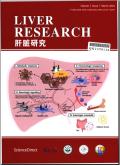Anti-PD-1 synergizes with RFA to suppress abscopal tumors and induce durable memory against recurrence in HCC
IF 2.1
Q2 Medicine
引用次数: 0
Abstract
Background and aims
Radiofrequency ablation (RFA) is the first-line treatment for early-stage hepatocellular carcinoma (HCC). However, recurrence after curative RFA remains a significant challenge for HCC patients. Although RFA induces an immune response, the anti-tumor effect is often limited by the immunosuppressive tumor microenvironment. Enhancing anti-tumor immunity is essential to improve treatment efficacy and prevent recurrence. In this study, we explore the efficacy and underlying mechanisms of the combination of RFA and anti-PD-1 in suppressing abscopal and recurrent tumors.
Methods
We established a bilateral subcutaneous HCC mouse model and performed complete RFA on the right-flank tumor. Anti-PD-1 or anti-IgG was administered post-RFA. Tumor growth, immune cell profiles, and molecular pathways were assessed using flow cytometry, immunohistochemistry staining, RNA-sequencing, and Western blot. Chemokines released by the tumor were detected by ELISA. An in vivo tumor rechallenge experiment was performed after a complete tumor regression to evaluate the immune memory induced by the RFA+anti-PD-1 treatment.
Results
RFA combined with anti-PD-1 significantly suppressed abscopal tumor growth and prolonged survival. Compared with RFA monotherapy, the infiltration of CD8+T cells and dendritic cells was significantly increased in the combined treatment group, while PMN-MDSCs were markedly reduced. Mechanistically, the chemokine signaling pathway and JAK-STAT signaling pathway were activated in the tumor of the RFA+anti-PD-1 group with upregulation of CXCL10 to recruit CD8+T cells. In addition, the combination therapy induced durable immune memory that inhibited rechallenge tumor outgrowth.
Conclusions
Our study discovered that RFA combined with anti-PD-1 induced anti-tumor immunity to inhibit abscopal tumors and durable immune memory to prevent recurrence, suggesting RFA+anti-PD-1 as a potential therapeutic strategy for multifocal HCC and preventing recurrence.

抗pd -1与RFA协同抑制体外肿瘤并诱导抗HCC复发的持久记忆
背景与目的射频消融(RFA)是早期肝细胞癌(HCC)的一线治疗方法。然而,治疗性RFA后的复发仍然是HCC患者面临的一个重大挑战。虽然RFA可诱导免疫应答,但其抗肿瘤作用往往受到肿瘤微环境免疫抑制的限制。增强抗肿瘤免疫是提高治疗效果和预防复发的关键。在这项研究中,我们探讨了RFA和抗pd -1联合抑制体外肿瘤和复发肿瘤的疗效和潜在机制。方法建立小鼠双侧皮下肝癌模型,对右侧肿瘤行完全射频消融。rfa后给予抗pd -1或抗igg。使用流式细胞术、免疫组织化学染色、rna测序和Western blot评估肿瘤生长、免疫细胞谱和分子通路。ELISA法检测肿瘤释放的趋化因子。在肿瘤完全消退后进行体内肿瘤再挑战实验,评估RFA+抗pd -1治疗诱导的免疫记忆。结果rfa联合抗pd -1治疗可显著抑制体外肿瘤生长,延长生存期。与RFA单药治疗相比,联合治疗组CD8+T细胞和树突状细胞的浸润明显增加,PMN-MDSCs明显减少。机制上,RFA+抗pd -1组肿瘤通过上调CXCL10募集CD8+T细胞,激活趋化因子信号通路和JAK-STAT信号通路。此外,联合治疗诱导持久的免疫记忆,抑制肿瘤的再挑战生长。结论我们的研究发现,RFA联合抗pd -1可诱导抗肿瘤免疫抑制体外肿瘤和持久免疫记忆,防止复发,提示RFA+抗pd -1可能是多灶性HCC的治疗策略,可预防复发。
本文章由计算机程序翻译,如有差异,请以英文原文为准。
求助全文
约1分钟内获得全文
求助全文

 求助内容:
求助内容: 应助结果提醒方式:
应助结果提醒方式:


